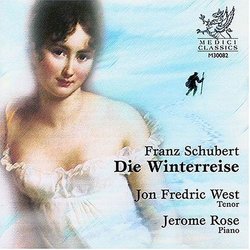| All Artists: Franz [Vienna] Schubert, Jerome Rose, Jon Fredric West Title: Franz Schubert: Die Winterreise Members Wishing: 0 Total Copies: 0 Label: Medici Classics Release Date: 9/28/2004 Genres: Pop, Classical Styles: Vocal Pop, Opera & Classical Vocal Number of Discs: 1 SwapaCD Credits: 1 UPCs: 675754736224, 802210300822, 675754736224 |
Search - Franz [Vienna] Schubert, Jerome Rose, Jon Fredric West :: Franz Schubert: Die Winterreise
 | Franz [Vienna] Schubert, Jerome Rose, Jon Fredric West Franz Schubert: Die Winterreise Genres: Pop, Classical |
Larger Image |
CD Details |
CD ReviewsPeter Bleedin' Pears . . . arrggh! L. E. Cantrell | Vancouver, British Columbia Canada | 12/20/2005 (1 out of 5 stars) "The immediately preceding reviewer writes of "the curdled, almost baritonal voice that Pears possessed" but then goes on to justify a five-star rating by saying that Pears' "noticeable wobble, not to mention his innately peculiar timbre, is the price one pays to hear a great musician." Such is the honestly held opinion of that reviewer and I respect both it and him. I, however, am absolutely not prepared to pay that price for the abominable Pears--not here, not anywhere, not anytime. Another reviewer points out that "The Penguin Guide gave this recording a rosette (its highest rating)". This is quite true and it goes a long way to explain why the Penguin Guide--and the good, grey Gramophone Magazine, too, for that matter--are never, never to be relied upon when they review British performances. With all the wealth of fine performances of Schubert's lieder available from people who actually can sing, why does anyone waste valuable time, money and shelf space on the unhappy groaning of Pears? And if, for some utterly incomprehensible reason, someone might actually want "a very British 'Winterreise'", as the same reviewer put it, there is always Ian Bostridge." Die Winterreise D.911 (The Winter Journey) Mr Bassil A MARDELLI | Riad El-SOLH , Beirut Lebanon | 04/17/2008 (5 out of 5 stars) " As far as I know, Schubert was the youngest composer ever. By his premature death at 31, the world lost potential masterpieces - forever. Poet Franz Grillparzer wrote him a commemoration inscribed at his tombstone that reads: "Here music has buried a treasure, but even fairer hopes." Franz Shubert (b 1797, d 1828) was the father of Song Cycle (D 795) written by poet William Muller. Later - 1827 - one year before he died, Shubert composed Muller's Winterreise - Winter Journey - D 911 considered the peak of `'German Lieder. `'. On his death bed - 1827 - Beethoven said of him "Schubert's intelligence is divine". Schubert outlived Beethoven by only one year. In this recording we can listen to 24 tenor/piano works out of about 600 pieces written and composed within such very short life span. This young composer is often referred to as the founder of the Lied. (I.e. Schubert is the founder of the German art songs of the nineteenth century for voice and piano). When first spoke about `'Winter Journey'', he told his friends "I am going to sing a cycle of sinister lieder to you.....They have touched me more than others." His friends were surprised as he never disclosed his plans to anyone. Nothing upset Schubert more than the death of `'the grand master Beethoven''. The young composer took part in Beethoven's funeral and carried one of the candles. A few months later, when he felt his hour was nearing, he asked to be buried at Beethoven's side. Beethoven's death caused a great grief to Schubert, heartbroken he couldn't compose again. (Perhaps until after six months) "Winterreise" is therefore separated in two groups, one written before and the other after Beethoven's death. Peter Pears (tenor) and Benjamin Britten (piano) have been exceedingly good at performing all 24 Lieder. One has to be in quiet mood to accept the absence of the traditional melodious music. In these songs Death is ubiquitous from `Gute Nacht' to `Der Leiermann'' .... Why one should love life ....should we still love it once we know it will be lost ....Winter ... Snow ... Frozen rivers....slippery grounds ...the looks of the cemeteries at the end of the road. My God !!! Only the living can appreciate the full meaning of this work. " A cult recording! Hiram Gomez Pardo | Valencia, Venezuela | 12/31/2009 (5 out of 5 stars) "This recording has surpassed the boundaries of its own historical time, to become a relevant cult issue over all these years.
This notable and successful encounter between Pears and the composer legated for the posterity one of the most expressive, incisive, idiomatic and dramatic versions ever recorded. Don't let it pass, due it's part of the legend. " |
